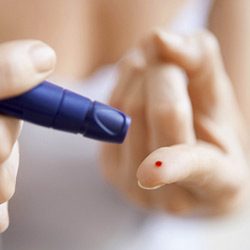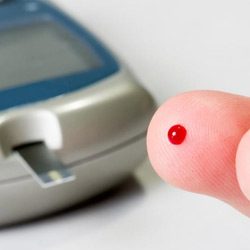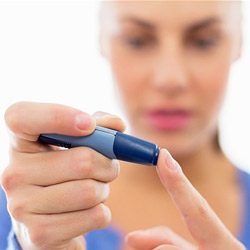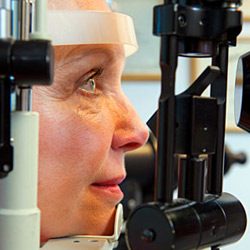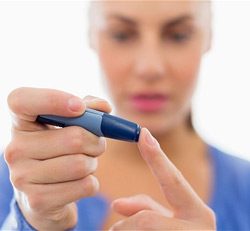Future Science Group (FSG) has announced the publication of a new article in Future Science OA, covering the use of nanocarriers and microbubbles in drug delivery for thrombotic disease. Ischemic heart disease and stroke caused by thrombus formation are responsible for more than 17 million deaths per year worldwide. Molecules with thrombolytic capacities have been developed … [Read more...]
Diabetes News

Long-term effects of type 2 diabetes on the brain: American Academy of Neurology Study
In just two years, people with type 2 diabetes experienced negative changes in their ability to regulate blood flow in the brain, which was associated with lower scores on tests of cognition skills and their ability to perform their daily activities, according to a new study published in the July 8, 2015, online issue of Neurology®, the medical journal of the American Academy … [Read more...]
Blood test could identify diabetes decades before it develops: Imperial College London Study
Scientists at the MRC's Clinical Sciences Centre (CSC) in West London are the first to show that a small molecule circulates in the blood of people who are in the early stages of type 1 diabetes. A simple blood test could detect this biological marker years, maybe decades, before symptoms develop. "If we can identify and treat patients earlier, we may be able to help them to … [Read more...]
Healthy diets for youth with type 1 diabetes difficult to find: A Study
Patients with type 1 diabetes mellitus (T1DM) often need to modify their eating habits, but many youths with T1DM do not consume a healthful diet. To learn more about the challenges their parents may face in providing them with a more healthful diet, researchers set out to discover the availability of healthier food options and the price difference of the food items at stores … [Read more...]
Islet Cell Transplantation for Type I Diabetes
People with type I diabetes may develop complications from long-term use of insulin and develop hypoglycemia, or severe low blood sugar. Now researchers have developed a therapy that may help protect type I diabetics from this life-threatening condition. As mom to 10-year-old twins Kendall and Garrett, Erika Totten is never off-duty. But just a few years ago, a chronic … [Read more...]
New approach in two decades for treating the damage that diabetes inflicts
It started out as a treatment for arthritis. But steered by science, it could become a first new approach in two decades for treating the damage that diabetes inflicts on the kidneys of millions of people. This past weekend, University of Michigan Medical School researchers and their colleagues presented promising results from a clinical trial of the experimental drug … [Read more...]
Genetic variation determines response to anti-diabetic drug: A University of Pennsylvania Study
In the first study of its kind, Penn researchers have shown how an anti-diabetic drug can have variable effects depending on small natural differences in DNA sequence between individuals. Mitchell Lazar, MD, PhD, Raymond Soccio, MD, PhD, and colleagues at the Perelman School of Medicine at the University of Pennsylvania, aim to apply this knowledge to develop personalized … [Read more...]
Brown fat transplant reversed type 1 diabetes: An American Physiological Society Study
An estimated 1.25 million people in the U.S. have type 1 diabetes (T1D). T1D is an autoimmune disease in which the pancreas stops producing insulin, a hormone that helps the body process glucose (sugar) from food. The disease can strike suddenly in children and adults and leads to a lifelong dependence on insulin injections or an insulin pump. Subhadra C. Gunawardana and … [Read more...]
‘Artificial Pancreas’ could help diabetes patients control their blood sugar: The American Chemical Society Study
Living with Type 1 diabetes requires constant monitoring of blood sugar levels and injecting insulin daily. Now scientists are reporting in the ACS journal Industrial & Engineering Chemistry Research the development of an implantable "artificial pancreas" that continuously measures a person's blood sugar, or glucose, level and can automatically release insulin as … [Read more...]
Neighborhood environments linked to type 2 diabetes: A Study
Neighborhood resources to support greater physical activity and, to a lesser extent, healthy diets appear to be associated with a lower incidence of type 2 diabetes, although the results vary by the method of measurement used, according to an article published online by JAMA Internal Medicine. Type 2 diabetes mellitus (T2DM) is an important cause of death and disability … [Read more...]
Pet care can help improve adolescents’ Type 1 diabetes management, pediatricians find
UT Southwestern Medical Center pediatric diabetes researchers found that incorporating routine pet care into a child's diabetes self-care plan can significantly improve monitoring of the disease, resulting in lower blood glucose levels. "Teenagers are one of the most difficult patient populations to treat, mainly because of the many psychosocial factors associated with that … [Read more...]
Diabetic blindness: Stem cells best treatment to block vision loss: A University of Virginia Study
A study has concluded that stem cells is the best treatment to block vision loss in diabetic blindness. University of Virginia School of Medicine researchers have taken a significant step forward in their efforts to use stem cells to block vision loss caused by diabetic retinopathy, a condition that affects millions of people with diabetes. The researchers have evaluated the … [Read more...]
Potential treatment for rare form of Diabetes: A Washington University Study
A study has concluded new potential treatment for rare form of diabetes. Cell death can trigger numerous diseases, including a rare and severe form of diabetes known as Wolfram syndrome. The cascade of cell death occurs when molecules spill from one part of a cell into another where they don't belong. Now, scientists working to find treatments for Wolfram syndrome have … [Read more...]
Diabetes medication reduces dementia risk: A Study
A study has confirmed that diabetes medication reduces dementia risk. Patients with type 2 diabetes have a dysfunctional sugar metabolism because the essential hormone insulin does not work effectively. Once the disease reaches an advanced stage, the body stops producing insulin altogether, which means that it has to be administered externally. Type 2 diabetes most commonly … [Read more...]
Link between type 2 Diabetes and Risk of low blood sugar levels: A University of Leicester Study
A study has confirmed that there is a link between type 2 Diabetes and risk of low blood sugar levels. Researchers from the University of Leicester and Leicester's Hospitals have discovered that many people suffering from type 2 diabetes also suffer from low blood sugar levels that can pose a significant risk to their health. The research team from the Leicester Diabetes … [Read more...]
Drug approved to treat osteoporosis may also benefit in diabetes: A Study
A study has confirmed that drug approved to treat osteoporosis may also benefit in treating diabetes. American scientists have discovered that a drug commonly used to treat osteoporosis in humans also stimulates the production of cells that control insulin balance in diabetic mice. While other compounds have been shown to have this effect, the drug (Denosumab) is already FDA … [Read more...]
New anti-diabetes drug developed
A new drug screening technology developed at the Harvard T.H. Chan School of Public Health has identified a new potential anti-diabetes compound--and a powerful way to quickly test whether other molecules can have a positive effect on a critical molecular pathway believed to be central to diseases ranging from diabetes to retinitis pigmentosa, cystic fibrosis, Huntington's … [Read more...]
Body’s response to injury, inflammation may hinder wound healing in diabetes: A Study
A study has established that body's response to injury, inflammation may hinder wound healing in diabetes. One of the body's own tools for preventing wound infections may actually interfere with wound healing, according to new research from Boston Children's Hospital. In a study published online in Nature Medicine, scientists from the hospital's Program in Cellular and … [Read more...]
Step towards Type 1 Diabetes vaccine by using nanotherapy
Two years ago, the Immunology of Diabetes Research Group at the Germans Trias Research Institute (at Universitat Autònoma de Barcelona -- Campus of International Excellence Sphere) reported a new experimental immunotherapy that prevented the onset of Type 1 Diabetes in mice predisposed to the disease. This work led to more studies with the support of the Spanish Government, … [Read more...]
Genetically elevated triglyceride level can protect against type 2 diabetes: A Study
A study has confirmed that genetically elevated triglyceride level can protect against type 2 diabetes. Elevated plasma triglyceride level is considered a risk factor for type-2 diabetes, but new findings suggest that a genetically-elevated triglyceride level is associated with protection against type-2 diabetes. Yann Klimentidis, an Assistant Professor at the Mel and Enid … [Read more...]
Polycystic ovary syndrome and diabetes are linked: A Study
A study has confirmed that Polycystic ovary syndrome and diabetes are linked. Nearly 50 percent of women with polycystic ovary syndrome (PCOS) develop pre-diabetes or type 2 diabetes before the age of 40, but the reasons for the correlation was unclear. In a new study in the American Journal of Physiology-Endocrinology and Metabolism, researchers report that inflammation is … [Read more...]
Charcot foot, a crippling diabetes complication, is increasing: A Study
A study has inferred that charcot foot, a crippling diabetes complication, is increasing. A growing number of diabetics are being diagnosed with a debilitating foot deformity called Charcot foot. Charcot foot often confines patients to wheelchairs, and in severe cases can require amputation. Charcot foot patients from around the country come to Loyola University Medical … [Read more...]
Cactus pads, chia and soybean can control diabetes: A Study
A study has established that Cactus pads, chia and soybean can control diabetes. The so called functional foods such as cactus pads, chia and soybean, when included in a balanced diet, help reduce obesity and control diabetes, says Nimbe Torres y Torres, from the Institute of Biomedical Research at the National Autonomous University of Mexico (UNAM). Functional foods are … [Read more...]
Bacteria may cause type 2 diabetes: A Study
A study has confirmed that bacteria may cause type 2 diabetes. Bacteria and viruses have an obvious role in causing infectious diseases, but microbes have also been identified as the surprising cause of other illnesses, including cervical cancer (Human papilloma virus) and stomach ulcers (H. pylori bacteria). A new study by University of Iowa microbiologists now suggests … [Read more...]
Increasing dietary fiber reduces risk of developing diabetes: A Study
A study has concluded that increasing dietary fiber reduces risk of developing diabetes. New research published in Diabetologia (the journal of the European Association for the Study of Diabetes) indicates that consuming greater quantities of dietary fiber reduces the risk of developing type 2 diabetes. Over 360 million people worldwide are estimated to be affected by … [Read more...]
Fish oil may help with diabetic neuropathy
A study has confirmed that fish oil may help with diabetic neuropathy. Approximately 50 percent of patients with diabetes suffer from nerve damage, or neuropathy. No cure exists, and the most effective treatment, keeping blood sugar in control, only slows neuropathy. A new study in the Journal of Neurophysiology, however, introduces a new alternative, omega-3 fatty acids … [Read more...]
Faster heart rate linked to diabetes risk: A Chinese Study
An association between resting heart rate and diabetes suggests that heart rate measures could identify individuals with a higher future risk of diabetes, according to an international team of researchers. In a four-year study of 73,357 Chinese adults, researchers observed that faster heart rates were positively associated with an increased risk of developing diabetes. … [Read more...]
Diabetic macular edema (DME) new treatment found: A Study
A new treatment has been found for Diabetic macular edema. Diabetic macular edema (DME) is a leading source of vision loss around the world, affecting about a fifth of people with long-term diabetes. Drugs that target a protein known as VEGF (vascular endothelial growth factor) inside the eye have greatly improved the treatment options in recent years, but only about half of … [Read more...]
Pressure-monitoring stockings to prevent wounds in diabetics: New Research
New research has invented pressure-monitoring stockings to prevent wounds in diabetics. Diabetics often have little feeling in their feet and don't perceive the body's pressure or temperature signals there. This can result in unnoticed wounds that then develop into abscesses. Many diabetics have to have toes or feet amputated. Now, a novel kind of pressure stocking developed … [Read more...]
Increased diabetes risk connected to higher levels of testosterone: A Study
A study has inferred that increased diabetes risk connected to higher levels of testosterone. Benign prostatic hyperplasia (BPH) -- or, simply, prostate enlargement -- is one of the most common diseases of aging among men in the United States. In fact, by the time they hit 80 or above, upwards of 90 percent of all men in the U.S. experience some degree of prostate enlargement. … [Read more...]
- « Previous Page
- 1
- …
- 7
- 8
- 9
- 10
- 11
- …
- 24
- Next Page »

